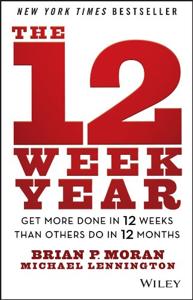
Want to learn the ideas in The 12 Week Year better than ever? Read the world’s #1 book summary of The 12 Week Year by Brian P. Moran, Michael Lennington here.
Read a brief 1-Page Summary or watch video summaries curated by our expert team. Note: this book guide is not affiliated with or endorsed by the publisher or author, and we always encourage you to purchase and read the full book.
Video Summaries of The 12 Week Year
We’ve scoured the Internet for the very best videos on The 12 Week Year, from high-quality videos summaries to interviews or commentary by Brian P. Moran, Michael Lennington.
1-Page Summary of The 12 Week Year
Overview
Thomas Edison once said, “If we did the things we’re capable of doing, we would astound ourselves.” Many people fall short of their potential because they don’t live up to that standard. If you perform at your best every day, your life will be very different from most people’s lives.
You can only find out by trying. This article will explain how you should change your annual planning cycle to a 12-week one, which will help you be more productive and successful. If you plan in 12-week segments, it’ll take less time for you to perform better and achieve more things. In this article, we’ll learn about vision development and making plans as well as keeping yourself on track with systems and measuring progress.
The author will discuss the following points:
Annual planning breeds complacency
Mike Tyson can teach us about goal setting and achieving our goals
Planning is important for success in life
Big Idea #1: We’re held back from achieving our potential, not by a lack of ideas, but by a lack of consistent execution.
Aphorisms such as “knowledge is power” are misleading because knowledge alone does not give you power. Rather, the ability to act on your knowledge gives you power.
Ideas are only powerful when they’re acted upon. Let’s look at a few examples. There are around 46,000 diet books available for sale in the United States, and the diet and fitness industry is worth $60 billion a year. However, many people who know this information still don’t act on it to improve their health.
Same is true in business. You need a great idea to succeed, but you also have to execute it well. Apple is an example of that: they took several good ideas and executed them very well in the market, making them successful. To achieve your full potential isn’t about dreaming big; instead, it’s about executing those dreams with skillful execution.
Research shows that the consistent application of best practices improves results. Ann Laufman, a financial advisor in Houston, was doing well but wanted to be doing even better.
Laufman implemented an approach called the 12 Week Year which focuses on executing tasks more effectively. Instead of focusing on a new initiative, she simply applied her existing strategy more effectively and found that it worked wonders.
Eventually, Laufman increased her output by 400 percent and became the first woman in her firm’s history to be awarded “associate of the year”. The 12 Week Year approach can help you execute better as well.
Big Idea #2: Thinking on an annual basis is a way to guarantee complacency and poor results.
Most of us make decisions based on a yearly schedule. We set New Year’s resolutions, celebrate our anniversaries, and report the results to shareholders every year.
But what if thinking about the year as a whole is not effective? Annual planning processes are counterproductive and hard to plan for, so it’s better to focus on shorter time periods. It’s easy in January to think that December is far away, which makes it easier to be complacent when things aren’t going well. If you don’t feel like there’s any urgency, then you won’t act with urgency. A common practice in business is having a push at the end of the year—December usually has higher sales than other months—so businesses whose tax years end in June have high sales during that month because they’re thinking about their upcoming deadline.
Top performers understand that shorter time periods bring more focus and urgency. Athletes were some of the first to embrace periodization, which is a technique that focuses on one skill at a time before moving on to another skill. The same approach works for business, or any other goal in life.





